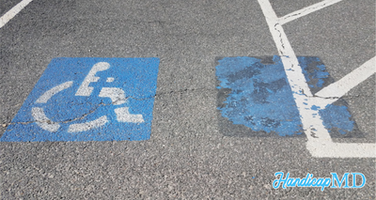
A Guide to Handicap Parking in Nevada
Introduction
Handicap parking is an essential aspect of ensuring accessibility and inclusivity for individuals with disabilities. In Nevada, there are specific regulations and guidelines in place to facilitate convenient and safe parking for people with disabilities. This guide aims to provide a comprehensive overview of handicap parking in Nevada, covering key information, regulations, and frequently asked questions (FAQs).
Understanding Handicap Parking
What is Handicap Parking?
Handicap parking refers to designated parking spaces reserved for individuals with disabilities. These parking spaces are strategically located close to building entrances or facilities, ensuring ease of access for people with mobility challenges. These parking spaces are marked with specific signage and symbols to indicate their purpose.
The Importance of Handicap Parking
Handicap parking plays a crucial role in promoting accessibility and ensuring equal rights for individuals with disabilities. It allows people with mobility limitations to have convenient access to essential services, including healthcare facilities, educational institutions, and public spaces. By providing designated parking spaces, society acknowledges and supports the needs of people with disabilities, fostering inclusivity and independence.
Disabled Parking in Nevada
Laws and Regulations
In NV, disabled parking is regulated under the Americans with Disabilities Act (ADA) and the Nevada Revised Statutes (NRS). These laws outline the requirements for accessible parking spaces, the eligibility criteria for obtaining a disabled parking permit, and the penalties for misuse of disabled parking spaces.
Eligibility for Disabled Parking Permits
To qualify for a disabled parking permit in Nevada, individuals must have a disability that impairs their mobility. The disabilities can be temporary or permanent, and they can range from physical impairments to conditions that affect one's ability to walk, such as respiratory or cardiovascular disorders. Medical documentation is usually required to prove eligibility.
Obtaining a Disabled Parking Permit in Nevada
To obtain a handicap parking permit in Nevada, individuals must complete an application form provided by the Department of Motor Vehicles (DMV). The application requires medical certification from a qualified healthcare professional, confirming the need for a parking permit. The completed application can be submitted to the local DMV office along with any applicable fees.
Validity and Renewal of Handicap Parking Permits
These parking permits in NV are typically valid for a specific period, which can vary based on the nature of the disability. Temporary permits may be issued for shorter durations, while permanent permits can be valid for several years. It is important to note that these parking permits must be renewed before their expiration to ensure continued access to designated parking spaces.
Handicap Parking Spaces
Designated Spaces and Accessibility
These types of parking spaces in NV must meet specific requirements to ensure accessibility. These spaces are wider than standard parking spaces, allowing for maneuverability and the use of mobility devices such as wheelchairs or walkers. Access aisles are also provided next to disabled parking spaces to allow individuals to enter and exit vehicles comfortably.
Accessible Features of Handicap Parking Spaces
These parking spaces are equipped with various accessible features to enhance convenience and safety. These features may include curb cuts, ramps, and tactile paving to facilitate wheelchair access. Additionally, proper signage and markings are essential to clearly identify and distinguish disabled parking spaces from regular parking spaces.
Enforcement and Penalties for Misuse
Misuse of these parking spaces is a serious offense and can result in penalties and fines. In NV, law enforcement agencies and parking enforcement officers actively monitor and enforce handicap parking regulations. Unauthorized parking in a designated space without a valid pass can lead to significant fines and possible vehicle towing.
Handicap Parking Signs
Standard Parking Signs
Standard parking signs are easily recognizable and universally understood symbols. These signs feature the International Symbol of Access, commonly known as the wheelchair symbol, along with the words "Handicap Parking" or "Accessible Parking." The signs are typically blue with white symbols and text, ensuring high visibility.
Information on Parking Signs
Disabled parking signs provide important information to drivers and serve as a visual reminder of the significance of these designated spaces. The signs may include additional information, such as fines for misuse, contact numbers for reporting violations, and the availability of accessible features in the parking area, such as ramps or elevators.
Parking Lot Accessibility
Accessible Parking Lot Design
Designing an accessible parking lot involves careful planning and adherence to specific guidelines. In Nevada, parking lots must include a sufficient number of disabled parking spaces based on the total number of parking spaces available. These spaces should be located close to building entrances and have proper signage and markings to ensure visibility and ease of access.
Proper Markings and Signage
Clear and prominent markings are crucial in identifying and distinguishing disabled parking spaces. Proper signage should be placed at the entrance of the parking lot, guiding drivers toward accessible parking areas. Directional arrows, pavement markings, and reflective materials can further enhance visibility, especially during nighttime or adverse weather conditions.
Accessible Routes to Buildings
These parking areas should be connected to the building entrances by accessible routes. These routes must be free of obstacles and provide smooth, barrier-free access for individuals with disabilities. Ramps, handrails, and tactile warning strips can enhance safety and assist people with mobility challenges in navigating the parking lot and reaching their desired destination.
Public Facilities and Handicap Parking
Parking at Government Buildings
Government buildings, including courthouses, city halls, and public offices, are required to provide adequate parking spaces to accommodate visitors with disabilities. These spaces should be conveniently located near building entrances, ensuring equal access to government services for all individuals.
Parking at Healthcare Facilities
Healthcare facilities, such as hospitals, clinics, and medical centers, must prioritize these parking to facilitate the ease of access for patients and visitors with disabilities. The proximity of these parking spaces to entrances is crucial in emergency situations where time is of the essence.
Parking at Educational Institutions
Educational institutions, including schools and universities, must have designated parking spaces for students, faculty, and visitors with disabilities. These parking spaces should be strategically located near entrances and campus facilities, ensuring that individuals with disabilities can navigate the campus with ease.
Parking at Recreational Areas
Public recreational areas, such as parks, stadiums, and entertainment venues, should have accessible parking options to accommodate individuals with disabilities. Proper signage and markings should guide visitors to designated parking spaces, allowing them to enjoy recreational activities without barriers or limitations.
Handicap Parking Etiquette
Respect for Disabled Parking Spaces
Respecting and preserving the integrity of disabled parking spaces is essential for fostering inclusivity and supporting individuals with disabilities. It is crucial for drivers without disabilities to refrain from using these designated spaces, even for a brief period, as it can deny access to those who genuinely need them.
Reporting Misuse of Disabled Parking Spaces
Reporting instances of misuse or abuse of these parking spaces is an important step in ensuring compliance and accountability. If you witness someone parking in a disabled space without a valid pass, you can contact local law enforcement or the parking enforcement authority to report the violation. Providing specific details, such as the license plate number and location, can assist in taking appropriate action.
Advocating for Accessibility
Promoting accessibility and advocating for the rights of individuals with disabilities goes beyond respecting these parking spaces. It involves creating an inclusive society where people of all abilities can participate fully. Supporting initiatives for accessible infrastructure, raising awareness, and educating others about the importance of accessibility are powerful ways to advocate for change.
Common FAQs about Disabled Parking in Nevada
Can I park in a disabled space without a pass if it's only for a few minutes?
No, it is strictly prohibited to park in a disabled space without a valid pass, regardless of the duration. These parking spaces are reserved for individuals with disabilities who require the convenience and accessibility provided by these designated spaces.
How long is a disabled parking pass valid in Nevada?
The validity of a parking pass in Nevada depends on the nature of the disability. Temporary passes are typically issued for a shorter duration, such as six months, while permanent passes can be valid for several years. It is important to renew the permit before its expiration to ensure continued access to designated parking spaces.
Can a disabled parking pass be used in rental cars?
Yes, a parking pass can be used in rental cars as long as the pass holder is present in the vehicle. The pass should be prominently displayed, and the individual must comply with all applicable parking regulations and restrictions.
What are the penalties for misusing a disabled parking space?
Misuse of a disabled parking space can result in significant penalties and fines. In Nevada, the fines for unauthorized parking in a these spaces without a valid pass can range from $250 to $500, depending on the jurisdiction. Repeat offenders may face increased fines and other consequences.
Are there any specific requirements for accessible van parking spaces?
Yes, accessible van parking spaces have additional requirements to accommodate the size and features of accessible vans. These spaces should be wider than standard disabled parking spaces and have an adjacent access aisle wide enough to accommodate a wheelchair lift or ramp.
Can I obtain a temporary disabled parking pass in Nevada?
Yes, individuals with temporary disabilities that affect their mobility can obtain a temporary parking placard in Nevada. Temporary passes are typically issued for a specific duration, such as six months, and require medical documentation supporting the need for the pass.
Conclusion
Handicap parking in Nevada is governed by specific laws and regulations to ensure accessibility and convenience for individuals with disabilities. By understanding the guidelines, respecting designated parking spaces, and advocating for accessibility, we can contribute to creating an inclusive society where everyone has equal access to essential services and facilities.
.png)






